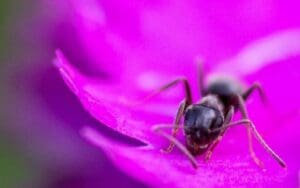Organic Bugbusters: Natural Repellents and Tips for your Garden Insect Problems

The Animalia kingdom’s littlest members, insects, are responsible for aspects of pollination as well as acting as cooperative defenders and decomposers for your yummy organic crops. But within the ranks of the little alien-esque world of the bug, lies some of the gardener’s worst enemies.
Here are afew tips to deter unwanted insects from entering your garden, as well as some natural (and upcycled) suggestions to get rid of the no-good pests once they’ve made it in.
Tips:
Get rid of all your weak plants. They will attract predators and may already be infected.
Grow a healthy soil. By adding clean mulch, compost, seaweed fertilizer and/or compost tea, it will help you develop vigorous plants, with strong defensive “immune-like” systems.
Clean your garden area. By getting rid of weeds and dead organic matter (debris) this will minimize creating inviting habitats for pesky free-loading insects.
Rotate your crops. This will help you to avoid re-infestation and the creation of breeding zones for insects as many of them are plant specific.
Water the ground – not the leaves. Wet foliage is a invitation for fungal damage and insect invasions.
Clean your tools. A little diluted vinegar and alcohol will help reduce the spreading of diseases and clingy insects, throughout your garden.
Natural Repellents:
- Cayenne Pepper: Sprinkle it sparingly on the dirt in your garden to keep ants away. It will also prevent dogs from digging, and cats from doing their business in your garden. Watering will flush it easily, so you will need to apply it often.
- Diatomaceous Earth: One of the oldest insecticides, it is made from the fossilized remains of single-cell organisms called diatoms. It kills earwigs, ants and fleas. But be sure to only use it around areas where you’re having problems, as its sharp surfaces will take out your friendly bugs without discrimination.
- Vinegar: Although it isn’t traditionally used as an insecticide it is a natural herbicide. It will kill some insects when sprayed directly, but vinegar is best used for clearing out unwanted real estate gobbling plants ( e.g. weeds), which nasty bugs love to squat in.
Upcycled Suggestions:
- Inverted Pots: This suggestion from Eric Vinje, at Planet Natural, is a great way to get rid of slugs and snails. “Invert a flower pot near a shady plant. Use a stick to prop up the flower pot or place on irregular ground – whatever will give enough of an entrance way for slugs and snails. They will crawl under the rim to avoid the heat. Check the flower pot at the end of the day and remove the slugs and snails.”
- Panty Hose: Old stockings cut into to smaller 6-8 inch sections and tied in a knot on the top, are great for dressing yummy veggies, like cabbage, to prevent bugs from unwanted snacking. Just give your plant a hat or use it as a sling to tie off things like melons and keep them from lying conveniently on the wet ground.
Dear cyber gardener, before applying sprays or any of the above techniques to your plants, I advise that you test it on a few leaves or around the base of a single plant. And remember, the best way to solve a problem is not by attacking the symptom but by addressing the core issue that is making your plant weak and thus attracting undesirable attention.
This summer, a healthy soil, and a well observed garden is your best defense.
Keep in touch with Baza on Twitter @bazanovic
Image: furlin

